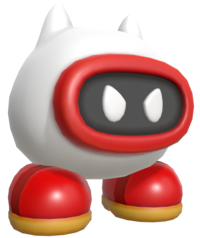Outmaway
| Outmaway | |||
|---|---|---|---|

| |||
| First appearance | Super Mario Bros. Wonder (2023) | ||
| |||
Outmaways are enemies that appear in Super Mario Bros. Wonder. They are round white enemies with cat-like ears, red-rimmed ski goggles, and red shoes that kick Ice Blocks and Shells in their way. Some Outmaways walk back and forth, behaving like a Goombrat, while others are stationary. They appear prominently in a level with their own name, Outmaway Valley, as well as A Final Uncharted Area: Poison Ruins and the Break Time! level Break Time! Kick It, Outmaway.
Their name is a shortening of the phrase "out of my way", a reference to their attack pattern, which is reminiscent of Buster Beetle from Super Mario Bros. 3, as well as unshelled Blue Koopa Troopas from Super Mario World. Outmaways can be defeated by any attack, but, like the unshelled blue Koopa Troopas of Super Mario World, they can stop and kick incoming shells or Ice Blocks even if their back is turned. However, they can only deal with one Ice Block or shell at a time, hence, they can be defeated if they are hit by an incoming Ice Block or shell while they are already preoccupied with another.
Gallery[edit]
Names in other languages[edit]
| Language | Name | Meaning |
|---|---|---|
| Japanese | ズンドコ Zundoko |
A term used in the Japanese song「ズンドコ節」(Zundoko-bushi). While the meaning is unknown, it may be an onomatopoeia for the sound of soldiers' boots marching,[1] likely referring to the enemy’s kicking ability. |
| Chinese | 足小子 Zúxiǎozǐ |
Foot Guy |
| Dutch | Outmaway |
- |
| French | Taptou |
Grammatical shortcut from tape tout ("kick everything") |
| German | Platzda |
From Platz da! ("out of my way!") |
| Italian | Scalciotto |
From scalciare ("to kick") and the diminutive suffix -otto |
| Korean | 뻥차 Ppeongcha |
From "뻥" (ppeong), which is possibly from a Korean reading of「ポン」(pon, onomatopoeia for striking), and "차다" (chada, "to kick") |
| Portuguese | Chutalino |
Contraction of chuta ali ("kick it there"), combined with the diminutive suffix -ino |
| Russian | Кышка Kyshka |
From кыш (kysh, "shoo!") and possibly кошка (koshka, "cat") |
| Spanish | Patapatí |
Portmanteau of patada ("kick") and pa'ti, which is from para ti ("for you") |
